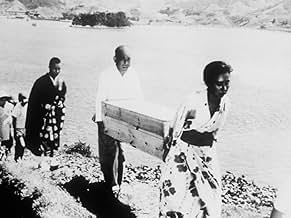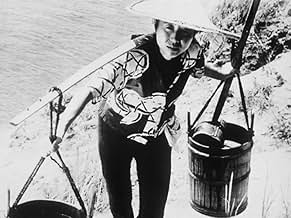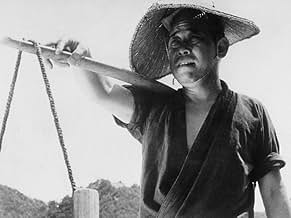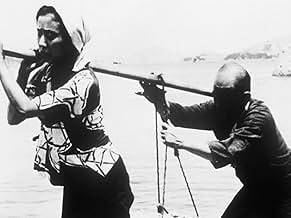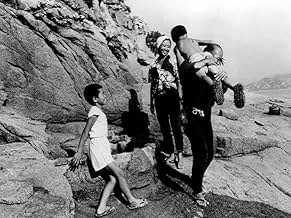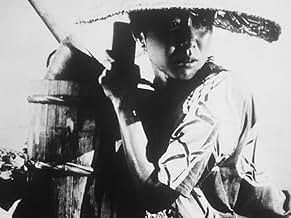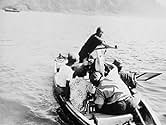IMDb-BEWERTUNG
8,0/10
6373
IHRE BEWERTUNG
Füge eine Handlung in deiner Sprache hinzuA family of four are the sole inhabitants of a small island where they struggle each day to irrigate their crops.A family of four are the sole inhabitants of a small island where they struggle each day to irrigate their crops.A family of four are the sole inhabitants of a small island where they struggle each day to irrigate their crops.
- Nominiert für 1 BAFTA Award
- 5 Gewinne & 1 Nominierung insgesamt
Handlung
WUSSTEST DU SCHON:
- Wissenswertes'Hadaka no shima' was made, in the words of its director, "as a 'cinematic poem' to try and capture the life of human beings struggling like ants against the forces of nature."
Ausgewählte Rezension
Okay, we have a loving tribute here, personal for director Kaneto Shindo as portraying the life of his parents. We have the rural hardship, and dogged persistence for live in a place where water is painfully hauled over a steep cliff, and we have the quiet cinematic language that describes it.
But also describes a life of simple pleasures. Shindo observes both closely, with sympathy.
The narrative thread of The Naked Island flows with the slow and dull repetition of life itself - if the movie is dull and monotonous it is because life is dull and monotonous and with a handful of fleeting moments of pleasure and joy scattered among the daily routine of making ends meet. In that sense, the artificiality that some reviewers have spoken of (certainly Shindo's decision to include no dialogues and the film almost silent save for a few natural sounds and voices) touches upon the heart of the thing.
The film follows the cycle of the seasons as the family tries to survive in the small island and it is by using the renewal of nature as a backdrop that Shindo draws emphasis on the periodic nature of life and time - the snake that eats its tail. The theme of renewal and the cycle of life and death is further symbolized through long, repetitious sequences of the man and wife transporting irrigation water in large buckets through the steep steps of a hillside and even further as Shindo ends the film cyclically with the same aerial shot that opened it.
The other major triumph for the great Japanese director is the visual language he employs to tell the simple and languidly paced story. This is probably a point that will only interest the avid film buff but I'm fairly sure it's that kind of person only that will seek out such a film anyway. The cinematography consists of full images, superb staging and framing of the (little is the truth) action, images as much beautiful in the subject they present as in the presentation of the subject itself and vibrating with honesty and clarity of vision. As with Kurosawa in DERSU UZALA, The Naked Island captures the essence of 'life as lived in' - the texture, the mood, the smell.
Combined with the symbolism he has carefully planted within the film, The Naked Island is a complete depiction of life on both macrocosmic and microcosmic levels. Of a very specific kind of life the truth is (rural life in a Japanese island in the 30's) but in the larger scheme of things and in the things that actually matter, what is true of one man is true of many.
In an age where directors are content to just wink at their audiences with a sense of smug satisfaction, presenting us with cynic and gimmicky films, swapping emotional catharsis for surprise 'twists', doing away with honest character portrayals in favour of decorating characters with random quirks, having forgotten visual storytelling in favour of redundant voiceovers, shaky cams or self-consciously, witty dialogue; in an age like this, The Naked Island seems to come from another planet, alien to the mentality and ethics of modern cinema as much as its bucolic subject matter is to modern city life. It's definitely not something that will appeal to most but those that will set out looking for it will not be disappointed.
But also describes a life of simple pleasures. Shindo observes both closely, with sympathy.
The narrative thread of The Naked Island flows with the slow and dull repetition of life itself - if the movie is dull and monotonous it is because life is dull and monotonous and with a handful of fleeting moments of pleasure and joy scattered among the daily routine of making ends meet. In that sense, the artificiality that some reviewers have spoken of (certainly Shindo's decision to include no dialogues and the film almost silent save for a few natural sounds and voices) touches upon the heart of the thing.
The film follows the cycle of the seasons as the family tries to survive in the small island and it is by using the renewal of nature as a backdrop that Shindo draws emphasis on the periodic nature of life and time - the snake that eats its tail. The theme of renewal and the cycle of life and death is further symbolized through long, repetitious sequences of the man and wife transporting irrigation water in large buckets through the steep steps of a hillside and even further as Shindo ends the film cyclically with the same aerial shot that opened it.
The other major triumph for the great Japanese director is the visual language he employs to tell the simple and languidly paced story. This is probably a point that will only interest the avid film buff but I'm fairly sure it's that kind of person only that will seek out such a film anyway. The cinematography consists of full images, superb staging and framing of the (little is the truth) action, images as much beautiful in the subject they present as in the presentation of the subject itself and vibrating with honesty and clarity of vision. As with Kurosawa in DERSU UZALA, The Naked Island captures the essence of 'life as lived in' - the texture, the mood, the smell.
Combined with the symbolism he has carefully planted within the film, The Naked Island is a complete depiction of life on both macrocosmic and microcosmic levels. Of a very specific kind of life the truth is (rural life in a Japanese island in the 30's) but in the larger scheme of things and in the things that actually matter, what is true of one man is true of many.
In an age where directors are content to just wink at their audiences with a sense of smug satisfaction, presenting us with cynic and gimmicky films, swapping emotional catharsis for surprise 'twists', doing away with honest character portrayals in favour of decorating characters with random quirks, having forgotten visual storytelling in favour of redundant voiceovers, shaky cams or self-consciously, witty dialogue; in an age like this, The Naked Island seems to come from another planet, alien to the mentality and ethics of modern cinema as much as its bucolic subject matter is to modern city life. It's definitely not something that will appeal to most but those that will set out looking for it will not be disappointed.
- chaos-rampant
- 12. Okt. 2008
- Permalink
Top-Auswahl
Melde dich zum Bewerten an und greife auf die Watchlist für personalisierte Empfehlungen zu.
- How long is The Naked Island?Powered by Alexa
Details
Box Office
- Weltweiter Bruttoertrag
- 14.673 $
- Laufzeit1 Stunde 36 Minuten
- Farbe
- Sound-Mix
- Seitenverhältnis
- 2.35 : 1
Zu dieser Seite beitragen
Bearbeitung vorschlagen oder fehlenden Inhalt hinzufügen




